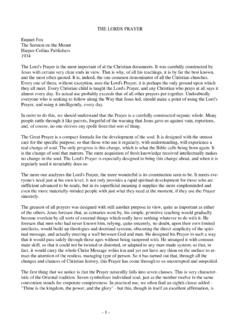Transcription of PSYCHOTHERAPY: PURPOSE, PROCESS AND PRACTICE
1 psychotherapy : purpose , PROCESS AND PRACTICE An Extension of the Principles of A Course in Miracles Introduction psychotherapy is the only form of therapy there is. Since only the mind can be sick, only the mind can be healed. Only the mind is in need of healing. This does not appear to be the case, for the manifes-tations of this world seem real indeed. psychotherapy is necessary so that an individual can begin to question their reality. Sometimes he is able to start to open his mind without formal help, but even then it is always so me change in his percept ion of interpersonal relat ionships that enables him to do so. Sometimes he needs a more structured, extended relationship with an official therapist.
2 Either way, the task is the same; the patient must be helped to change his mind about the reality of illusions. 1. THE purpose OF psychotherapy Introduction Very simply, the purpose of psychotherapy is to remove the blocks to truth. Its aim is to aid the pa-tient in abandoning his fixed delusional system, and to begin to reconsider the spurious cause and effect relationships on which it rests. No one in this world escapes fear, but everyone can reconsider its causes and learn to evaluate them correctly. God has given everyone a Teacher Whose wisdom and help far ex-ceed whatever contributions an earthly therapist can provide. Yet there are times and situations in which an earthly patient-therapist relationship becomes the means through which He offers His greater gifts to both.
3 What better purpose could any relationship have than to invite the Holy Spirit to enter into it and give it His Own great gift of rejoicing? What higher goal could there be for anyone than to learn to call upon God and hear His Answer? And what more transcendent aim can there be than to recall the Way, the Truth and the Life, and to remember God? To help in this is the proper purpose of psychotherapy . Could anything be holier? For psychotherapy , correctly understood, teaches forgiveness and helps the patient to recognize and accept it. And in his healing is the therapist forgiven with him. Everyone who needs help, regardless of the form of his distress, is attacking himself, and his peace of mind is suffering in consequence.
4 These tendencies are often described as self destructive, and the patient often regards them in that way himself. What he does not realize and needs to learn is that this self, which can attack and be attacked as well, is a concept he made up. Further, he cherishes it, de-fends it, and is sometimes even willing to sacrifice his life on its behalf. For he regards it as himself. This self he sees as being acted on, reacting to external forces as they demand, and helpless midst the power of the world. psychotherapy , then, must restore to his awareness the ability to make his own decisions. He must become willing to reverse his thinking, and to understand that what he thought projected its effects on him were made by his projections on the world.
5 The world he sees does therefore not exist. Until this is at least in part accepted, the patient cannot see himself as really capable of making decisions. And he will fight against his freedom because he thinks that it is slavery. The patient need not think of truth as God in order to make progress in salvation. But he must begin to separate truth from illusion, recognizing that they are not the same, and becoming increasingly willing to see illusions as false and to accept the truth as true. His Teacher will take him on from there, as far as psychotherapy : purpose , PROCESS and PRACTICE A Course In Miracles 2/13 5/16/2009 he is ready to go. psychotherapy can only save him time. The Holy Spirit uses time as He thinks best, and He is never wrong.
6 psychotherapy under His direction is one of the means He uses to save time, and to prepare additional teachers for His work. There is no end to the help that He begins and He directs. By whatever routes He chooses, all psychotherapy leads to God in the end. But that is up to Him. We are all His psychotherapists, for He would have us all be healed in Him. 2. THE PROCESS OF psychotherapy Introduction psychotherapy is a PROCESS that changes the view of the self. At best this new self is a more be-neficent self-concept, but psychotherapy can hardly be expected to establish reality. That is not its func-tion. If it can make way for reality, it has achieved its ultimate success. Its whole function, in the end, is to help the patient deal with one fundamental error; the belief that anger brings him something he really wants, and that by justifying attack he is protecting himself.
7 To whatever extent he comes to realize that this is an error, to that extent is he truly saved. Patients do not enter the therapeutic relationship with this goal in mind. On the contrary, such con-cepts mean little to them, or they would not need help. Their aim is to be able to retain their self-concept exactly as it is, but without the suffering that it entails. Their whole equilibrium rests on the insane belief that this is possible. And because to the sane mind it is so clearly impossible, what they seek is magic. In illusions the impossible is easily accomplished, but only at the cost of making illusions true. The patient has already paid this price. Now he wants a better illusion. At the beginning, then, the patient s goal and the therapist s are at variance.
8 The therapist as well as the patient may cherish false self-concepts, but their respective perceptions of improvement still must differ. The patient hopes to learn how to get the changes he wants without changing his self-concept to any significant extent. He hopes, in fact, to stabilize it sufficiently to include within it the magical pow-ers he seeks in psychotherapy . He wants to make the vulnerable invulnerable and the finite limitless. The self he sees is his god, and he seeks only to serve it better. Regardless of how sincere the therapist himself may be, he must want to change the patient s self-concept in some way that he believes is real. The task of therapy is one of reconciling these differences.
9 Hopefully, both will learn to give up their original goals, for it is only in relationships that salvation can be found. At the beginning, it is inevitable that patients and therapists alike accept unrealistic goals not completely free of magical overtones. They are finally given up in the minds of both. I. The Limits on psychotherapy Yet the ideal outcome is rarely achieved. Therapy begins with the realization that healing is of the mind, and in psychotherapy those have come together who already believe this. It may be they will not get much further, for no one learns beyond his own readiness. Yet levels of readiness change, and when therapist or patient has reached the next one, there will be a relationship held out to them that meets the changing need.
10 Perhaps they will come together again and advance in the same relationship, making it holier. Or perhaps each of them will enter into another commitment. Be assured of this; each will pro-gress. Retrogression is temporary. The overall direction is one of progress toward the truth. psychotherapy itself cannot be creative. This is one of the errors which the ego fosters; that it is ca-pable of true change, and therefore of true creativity. When we speak o f the saving illusio n or the fi-nal dream, this is not what we mean, but here is the ego s last defense. Resistance is its way of look-ing at things; its interpretation of progress and growth. These interpretations will be wrong of necessity, because they are delusional.







![British Anaesthetic and Recovery Nurses Association [BARNA]](/cache/preview/3/3/6/4/d/c/d/4/thumb-3364dcd4e351674f719a97a46568aade.jpg)


